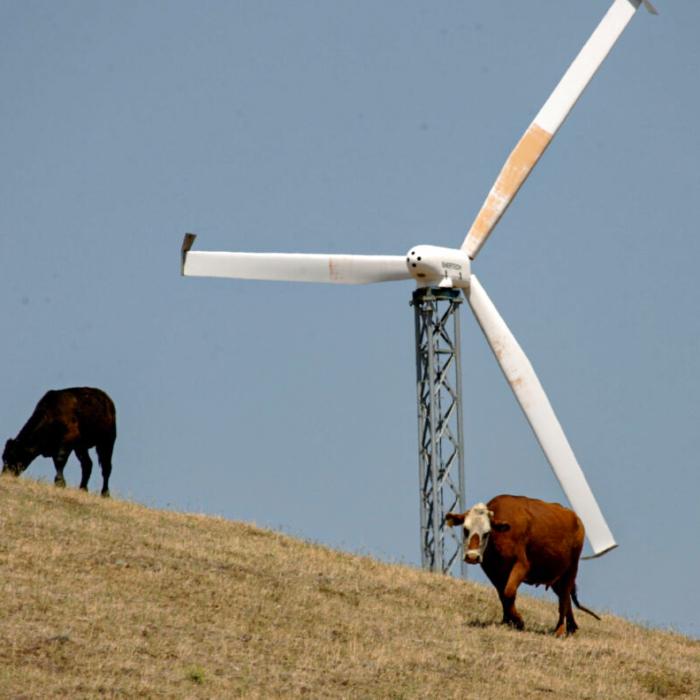An MP raised security concerns on Thursday as a Chinese wind turbine giant moved closer to building its first European manufacturing plant in Scotland.
It comes as the the EU’s competition chief said the bloc has launched a preliminary review into Chinese wind turbine makers.
The Strategic Investment Model (SIM) projects also included a separate tower and foundation manufacturing facility project proposed by Chinese company Dajin Heavy Industry in its “progress” list.
Mingyang’s plan to build a factory in the UK was first reported in December 2021, when the company signed a Memorandum of Understanding with the UK’s Department for Business and Trade (DBT).
John Edwards, then HM trade commissioner for China, said the company intended to “make the UK their European manufacturing base” and “establish the UK’s first-ever turbine assembly factory.”
Commenting on Mingyang’s inclusion in Scotland’s SIM priority list, the SNP’s Stewart McDonald MP said the government needs to “explain why a project of this magnitude in an industry that is clearly sensitively strategic has been allowed to go ahead.”
“We are handing over such important capability to the net-zero transition to an entity that comes from an authoritarian and hostile state at a time when the European Union and other countries are going in a different direction,” he told BBC Scotland.
“Just this week the EU launched its anti-trust investigation into Chinese turbine manufacturers.
“This very company that’s going to be setting up here in Scotland was declined by our Norwegian neighbours recently for a similar project.”
The MP also said Whitehall and the Scottish Government both lack a “cohesive strategy when it comes to approaching the China challenge,” the report said.
Security and Competition Concerns
Western countries are increasingly wary of Chinese products that can hold data, including communication and surveillance equipment, smart cars, household appliances, and even cranes, because the communist regime’s National Intelligence Law requires all organisations and citizens to “support, assist, and cooperate with national intelligence efforts.”Security experts have warned that this means any company in China can be coerced to hand data they hold over to the communist regime, and these data can be fed into artificial intelligence algorithms to help form useful intelligence.
Giles Dickson, CEO of WindEurope, told a conference in September last year there are “300 sensors on a modern wind turbine” and called on the data from non-European sensors to be “stored and analysed exclusively in Europe.”
He also asserted that Chinese wind turbine manufacturers had been able to offer “a lower price than turbines made in Europe ... with deferred payment terms that companies headquartered in OECD countries are not allowed to offer.”
Karsten Merker, co-general manager for Mingyang Europe, denied that the company had been getting unfair subsidies from the Chinese regime, telling renewable energy news website Recharge the company is listed on the Shanghai stock exchange, meaning there are “certain accounting rules” and “transparency” requirements.
Mr. Merker said Mingyang is not “directly supported by the Chinese state.” He also said the company is willing to have its data vetted by wind farm operators in Europe before they are sent to the manufacturing facility in China for maintenance, the report said.
On Tuesday, EU competition chief Margrethe Vestager said the European Commission had launched a new inquiry into Chinese wind turbine suppliers and was investigating the conditions for wind park development in Spain, Greece, France, Romania, and Bulgaria.
A spokesperson for the commission said it had requested information for a “preliminary review.”
The review is a step that could lead to the launch of an in-depth investigation by the EU executive, although does not necessarily do so.
In response, a Chinese commerce ministry official said it would be the fourth investigation initiated by the European Union in the past two months using foreign subsidies legislation against Chinese companies, and claimed that the EU had “wantonly distorted the definition of subsidies, and the procedural standards were not open and transparent, which is a protectionist act that harms the level playing field in the name of fair competition.”
The Scottish Government has said the decision to prioritise projects for SIM investment is made by the offshore wind industry.
In an email to The Epoch Times, a Scottish Government spokesperson said: “The Scottish Government welcomes the involvement of international companies in the offshore wind sector and supply chain and, like the UK government, considers that China’s global impact means it is important to maintain pragmatic economic relationships with the potential to create jobs and growth.
“Where we or our agencies are providing project support, we take seriously the need for appropriate due diligence. The Scottish and UK governments, relevant agencies, and delivery partners work closely with experts and investing businesses on this issue.
“The UK government is responsible for national security and energy-related critical national infrastructure.”
The Epoch Times has reached out to the DBT and Mingyang for comment.







